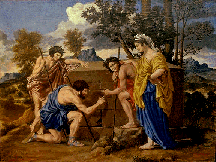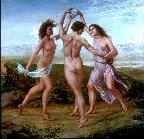 On
the Arcadian Theme
On
the Arcadian Theme On
the Arcadian Theme
On
the Arcadian Theme
The term "Arcadian" has gone through many transformations through the ages as well. A native race of the wild hills of the Peloponnesos in southern Greece, the Arcadians were "a tribe older than the moon" certainly pre-dating the Dorian invasions, or "the birth of Jupiter" and the establishment of the Olympian Pantheon. According to Curtis N. Runnels in the March 1995 issue of Scientific American they may have inhabited the area as early as 50,000 years ago causing, through millennia of poor land management, the severe erosion that created the wasteland of dry shrubs and rocks we visit today. The popular term "Arcadian," describes a utopian garden paradise where serene pastoral folk drink, dance and lounge around in an endless summer. It is here in this untroubled land that Nicolas Poussin's shepherds first encounter the solemn reality that all things must pass.
This atmosphere of nostalgia in Utopia has survived as the philosopher's definition of "Arcadia," leaving behind a vital and ancient tapestry of folklore. In the reality of mythological Arcadia there were many terrifying dangers, the least of which was death, for its vast population of nymphs, dryads, naiads, satyrs, fauns, Cyclops and lesser gods such as Pan and occasionally Dionysus. Perhaps it was these disenfranchised deities who brought with them the carpet of lush vegetation that transformed the rocky wasteland into the wild and crazy playground of Ovid's "Metamorphoses". In a sense, classical Arcadia was never a Utopia, and its character is as complex and mysterious as the human psyche.
It may indeed be the place where the clear and rational Olympians banished those untamed and unnamable qualities, far from the ordered hierarchies needed by a dynasty of tyrannical sky-gods. Arcadia is then the anarchist state inhabited by uncontrollable misfits where Pan keeps vigil over his domain, scaring away rational beings with his unearthly howls and screeches. Maybe Poussin's painting has more of a lesson than even he realized. Death is not in Arcadia, because the wasteland of Arcadia, like the subconscious, like the moon, like cyberspace, is the realm of the imagination, where all things are possible.
Elsie Russell 6/2/95
Back to Net in Arcadia: The Virtual Museum of Contemporary Classicism